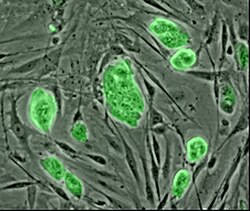Antibody cocktail may lead to safer stem cell therapy
A Stanford University research team may have found a solution to the biggest challenge of using embryonic stem cells – that they can cause tumours. ESCs can form all forms of tissue, but that very plasticity provokes some rogue cells to form “teratomas”, peculiar mixtures of tissues that can include hair and teeth.

A Stanford University research team may have found a solution to the biggest challenge of using embryonic stem cells – that they can cause tumours. ESCs can form all forms of tissue, but that very plasticity provokes some rogue cells to form “teratomas”, peculiar mixtures of tissues that can include hair and teeth. The same concerns surround induced pluripotent stem (iPS) cells.
To find a way of removing rogue cells from cultures which have morphed into other stem cell types, researchers at Stanford University led by Micha Drukker and Chad Tang screened a library of antibodies against hESCs. They eventually found one which binds only to pluripotent cells. This allowed them to winnow rogue cells from the differentiated cells.
If this technique proves successful, it could breathe new life into hopes for therapies using ESCs. Two companies, Geron and Advanced Cell Technology, are currently running clinical trials of cells grown from hESCs to treat spinal injuries and some forms of blindness respectively. Both had to present extensive evidence from animal experiments to convince the US Food and Drug Administration that the transplanted cells will not form teratomas. ~ New Scientist, Aug 14
Jared Yee
embryonic stem cells
stem cells
US
